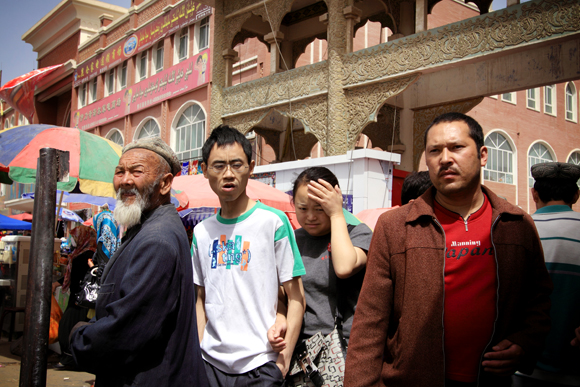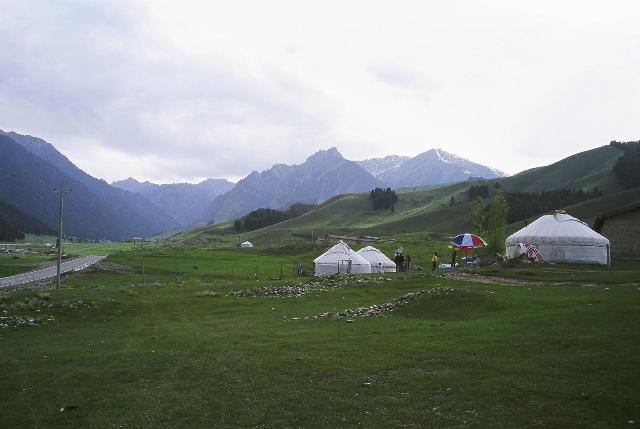Abdurehim Mollek, a Muslim Uyghur from Aksu prefecture in the northwestern region of Xinjiang, fled from custody on August 11, according to his son, who is now in hiding. On August 19, police from Beijing and Mollek’s native Aksu Prefecture seized him from his hiding place under a bridge in Beijing.
The same story for 11 times
“Witnesses told me six Han and Uyghur police ran into the place where my father and other petitioners were sitting or sleeping – they yelled at everyone to be quiet, pushing and shaking my father and taking him off in a car,” the son, Abdushukur Mollek, said.
“My father resisted and was handcuffed. They took him away with a  woman petitioner from Kashgar,” another ancient Silk Road city in Xinjiang, he said.
woman petitioner from Kashgar,” another ancient Silk Road city in Xinjiang, he said.
Hours before his detention, Abdurehim Mollek said in an interview that two officials whom he identified as Abdulla and Rozi Memtimin had urged him to return home, “that they had a plan to resolve my case. I said, this is my 11th trip to Beijing, and you said the same thing the last 10 times so I cannot believe you.”
“I said, ‘If you really want to solve the problem, then you have to talk with my older son in Aksu – if he says the problem is solved, I will go back alone, without your escort.”
Planned to petition
Abdushukur Mollek said they had been planning to petition publicly in Tiananmen Square or at an international news bureau to make their voices heard.
Abdulla, an official in the petitioner unit in Qingnian village, in Aksu’s Onsu county (in Chinese, Wensu), and Rozi Memtimin, the village deputy chief, abruptly ended the call when contacted by telephone on 13 August.
Abdulla confirmed earlier that six officials had been charged with returning Abdurehim Mollek from Beijing, including two police officers.
Rozi Memtimin said Abdurehim Mollek “won’t listen to us … His land is being used by others, and we cannot take it back until the contract ends.”
“I’ve gone to Beijing five times to bring him back – it costs 20,000-25,000 yuan per person – so far we have spent more than 1 million yuan on travel alone because we have to pay for Mollek’ s expenses on each return trip.”
“He has no patience,” Memtimin said. “He leaves every time we discuss the issue – how do we solve the problem without his presence?”
Rozi Memtimin denied that Abdurehim Mollek had been detained in the past and said he had instead been sent  to a “political education center, with other 20 petitioners, for education.”
to a “political education center, with other 20 petitioners, for education.”
Farmland taken and sold
Abdurehim Mollek said earlier this month that he had already been detained without trial for two years by authorities in Onsu county after he tried to petition over the actions of local officials.
Abdurehim Mollek has been petitioning ever since local officials in Kizil (in Chinese, Qingnian) village took over 220 mu (36 acres) of his farmland in 1997.
His property was part of a total 3,000 mu (494 acres) of land which belonged to 20 Uyghur farmers, taken by local officials and sold to a Chinese farmer surnamed Chen who had recently settled in the village from another province.
The land was later resold to another Chinese farmer surnamed Lu, who is the current owner.
Sentenced without trial
Abdurehim Mollek said the two Chinese farmers are close relatives of village chief Han Guoming, although calls to the village office to confirm this went unanswered.
After being provided only a portion of his promised compensation, Abdurehim Mollek petitioned local and provincial authorities for 10 years.
In 2007, he began to petition the central government and has since traveled to Beijing 11 times to plead his case. In 2008, he was held without trial in a detention center in Onsu county for two years.
His most recent visit to Beijing was his second trip in three months, and the second since his release.
After his previous trip to the capital, Abdurehim Mollek said he was forcibly repatriated to Aksu prefecture and held in a local mental hospital for 60 days. He has been returned to Xinjiang under police guard nearly every time he has petitioned the central government.
Petitioners harassed
China’s army of petitioners say they are repeatedly stonewalled, detained in “black jails,” beaten, and harassed by authorities if they  try to take a complaint against local government actions to a higher level of government.
try to take a complaint against local government actions to a higher level of government.
Millions of Uyghurs populate Central Asia and Xinjiang. Uyghurs say they have long suffered ethnic discrimination, oppressive religious controls, and continued poverty and joblessness despite China’s ambitious plans to develop its vast northwestern frontier.
Those frustrations erupted in July 2009 in deadly riots that left nearly 200 people dead, by the Chinese government’s tally.
Chinese authorities blame Uyghur separatists for a series of deadly attacks in recent years and accuse one group in particular of maintaining links to the al-Qaeda terrorist network.
HRH Bergen, based on article by Shohret Hoshur, published at Radio Free Asia’s Uyghur service.
Related links:
Rebiya Kadeer condemns terrorism
China convicts three Uyghur web managers on state security charges





